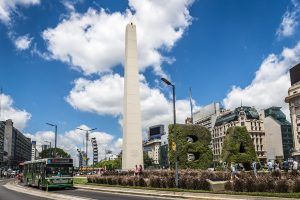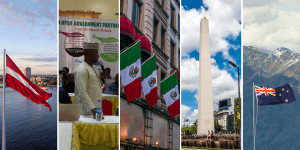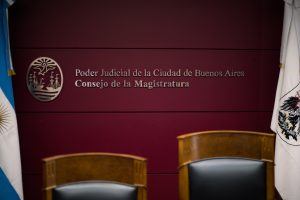JusLab: Making Open Justice Accessible to All in Buenos Aires, Argentina
JusLab: Justicia abierta accesible para todos en Buenos Aires, Argentina
This blog is part of a series from students of the Institut de Sciences Politiques de Paris who interviewed reformers working on initiatives recognized by the OGP Leaders Network. Read the series here.
Civic trust is vital to states’ legitimacy. However, when it comes to issues of civil justiceTo address barriers that prevent citizens from having their justice needs met, OGP participating governments are working to expand transparency, accountability, and inclusion into all systems of justi... that require specialized knowledge of the law, how are citizens supposed to stay informed, let alone trust the decisions made?
In Buenos Aires, Argentina, an open justiceAn open, independent, and impartial justice system serves as a foundation for better access to justice by fulfilling all people’s civil liberties and allowing individuals to more effectively protect... initiative called JusLab aims to address the global lack of judicial transparencyAccording to OGP’s Articles of Governance, transparency occurs when “government-held information (including on activities and decisions) is open, comprehensive, timely, freely available to the pub... More with a local, city-level approach. Open justice relies on civic engagement to properly function. This means that around the world, community members who participate should have not only some familiarity with government institutions but also an ability to analyze legal frameworks and decisions.
Nonetheless, if citizens lack the skills to properly participate with judicial systems, what impact can open justice have? Since it already appeals to those who have a background in policy or community engagement, could it further alienate the court system from everyday citizens?
Mariano Heller, from the Council of Magistrates of Buenos Aires, Joaquin Caprarulo, from the Civil Association for Equality and Justice, and their team of open justice advocates have been developing an answer. Both are law scholars from the University of Buenos Aires and recognize the need for judicial educationAccountability within the public education system is key to improving outcomes and attainment, and accountability is nearly impossible without transparent policies and opportunities for participation ... as well as transparency. According to them, mistrust of the judiciaryWhile a majority of open government reforms occur within the executive branch, OGP members are increasingly taking on commitments to increase the openness of the judicial branch. Technical specificati... is widespread “mainly because of what people know about judicial power, which is not much and what they read in the papers, which is a lot.” The problem is not just a lack of transparency but more importantly, according to Heller, that “people in Buenos Aires don’t even know that we have a [dedicated] judicial branch”.
This has been a major area of concern as it suggests that only the most privileged Argentines have the means to constructively participate in government and legal processes. Citizens have therefore begun to believe the judiciary is “detached from everyday peoples’ problems, somehow elitist and privileged” according to Caprarulo.
A lack of education around the judiciary would contradict the purposes of ‘transparency’ because citizens cannot make sense of the information that has been made public. So, the work of JusLab is two-fold, to educate the community about the judiciary and work to establish a transparent institution and develop trust in its authority.
The duo has their work cut out for them, they admitted, as “it’s not easy to explain what the judiciary of Buenos Aires does”. This is partly because the Buenos Aires judiciary shares its work with the federal court and the overlaps in the jurisdiction can get complicated. So JusLab starts early with its high school workshops on the country’s Constitution and its impact on the law. Using specialized board games, JusLab works to normalize judicial education for the next generation.
Then comes the task of making the justice system more transparent. Most judges are predictably reluctant to have some of their information publicly available such as their salaries and assets. Thus, while Juslab waits for more judges to change their outlook, they have asked judges to offer simple language explanations on judicial decisions in front of a camera, casting light on the inner workings of the court to all sectors and demographics of the public. JusLab has also encouraged partner courts in Buenos Aires to tweet their decisions in vernacular Spanish. Disseminating this content on social media reaches a broader audience and, importantly, puts a face to state authority.
Still, not every judge is enthusiastic about this initiative, often preferring to let their judicial decisions speak for themselves and offer no further explanations. Heller frequently affirms that there is still work to do: “In this era, this [opacity] is no longer a possibility. We don’t need judges going on talk shows to make their decisions, but we have to find something in the middle”.
By increasing judicial education and transparency across all ages and communities in Buenos Aires and sharing its findings with other countries to help address this issue globally, JusLab has begun the great journey of rendering justice open to all.
Este blog es parte de una serie de estudiantes del Institut de Sciences Politiques de Paris que entrevistaron a reformadores que trabajan en iniciativas reconocidas por OGP Leaders Network. Lea la serie aquí.
La confianza cívica es fundamental para la legitimidad de los estados. Sin embargo, cuando la justicia civil requiere de un conocimiento especializado del derecho, ¿Cómo puede la ciudadanía mantenerse informada y confiar en las decisiones del gobierno?
En Buenos Aires, Argentina, una iniciativa de justicia abierta llamada JusLab pretende atender la falta de transparencia judicial que existe a nivel global con una iniciativa local. La justicia abierta depende de la participación ciudadana para poder funcionar. Esto significa que, para poder participar, los miembros de la comunidad no solo deben tener cierta familiaridad con las instituciones de gobierno, sino que además deben tener la capacidad de analizar los marcos legales y las decisiones gubernamentales.
Pero si la ciudadanía no tiene la capacidad de participar adecuadamente en los sistemas judiciales, ¿Qué impacto podría tener la justicia abierta? Ya que el tema es atractivo para quienes tienen conocimiento en política o participación comunitaria, ¿podría separar a la ciudadanía aún más del sistema judicial? Mariano Heller del Consejo de Magistrados de Buenos Aireas, Joaquín Caprarulo de la Asociación Civil para la Equidad y la Justicia y su equipo de impulsores de la justicia abierta han estado trabajando en una respuesta a estas preguntas. Ambos son académicos de la Universidad de Buenos Aires y reconocen la necesidad de la educación judicial y de la transparencia. En su opinión, la falta de confianza en el sistema judicial está generalizada “principalmente por lo que la gente sabe del poder judicial, que no es mucho y lo que leen en los periódicos, que es mucho.” El problema no es solo la falta de transparencia, sino lo que es más importante, en la opinión de Heller, que “la gente de Buenos Aires ni siquiera sabe que tenemos un poder judicial [dedicado]”.
Esto ha sido una preocupación importante, pues sugiere que solamente los argentinos más privilegiados tienen los medios para participar de forma constructiva en el gobierno y en los procesos legales. Por lo tanto, la ciudadanía piensa que el poder judicial está “desvinculado de los problemas cotidianos de la gente, un tanto elitista y privilegiado”, comenta Caprarulo.
La falta de educación alrededor del sistema judicial contradice los objetivos de la transparencia porque la ciudadanía no puede comprender la información que el gobierno pone a su disposición. Así, el trabajo de JusLab tiene dos vertientes: educar a la comunidad sobre el sistema judicial y trabajar en el establecimiento de una institución transparente y crear confianza alrededor de ella.
El dúo admite que tiene mucho trabajo por delante, pues “no es fácil explicar lo que el poder judicial de Buenos Aires hace”. Esto se deben en parte a que el poder judicial de Buenos Aires comparte su trabajo con el tribunal federal y estos traslapes pueden ser complicados. JusLab inicia desde temprano con sus talleres para secundarias sobre la Constitución del país y su impacto en el derecho. Con juegos de mesa especiales, JusLab trabaja en normalizar la educación para la nueva generación.
Lo siguiente es la tarea de hacer el sistema judicial más transparente. La mayoría de los jueces se muestran reacios a poner a disposición del público su información, por ejemplo sus salarios o bienes. Así, mientras JusLab espera que más jueces cambien de opinión, les han pedido ofrecer explicaciones en un lenguaje sencillo sobre sus decisiones judiciales frente a una cámara, arrojando luz sobre el funcionamiento de los tribunales a todos los sectores y demografías del público. JusLab ha invitado a los tribunales de Buenos Aires publicar tuits sobre sus decisiones en un lenguaje coloquial. La difusión de este contenido en redes sociales ayuda a alcanzar una mayor audiencia y, lo que es más importante, le otorga un rostro a la autoridad.
Sin embargo, no todos los jueces han mostrado entusiasmo por esta iniciativa y muchas veces prefieren que sus decisiones judiciales hablen por sí mismas y no ofrecer más explicaciones. Heller afirma constantemente que aún hay trabajo por hacer: “En esta era, esto [la opacidad] ya no es una posibilidad. No necesitamos jueces que vayan a programas de televisión a hablar sobre sus decisiones, pero necesitamos encontrar el punto medio”.
Con una mayor educación y transparencia en todas las edades y comunidades de Buenos Aires y compartiendo los hallazgos con otros países para empezar a atender este tema a nivel global, JusLab ha empezado a transitar el camino de abrir la justicia para todos.
No comments yet
Related Content

Judicial Transparency

A Guide to Open Government and the Coronavirus: Justice
People can encounter justice problems in nearly every aspect of life, including health, employment, education, housing and public safety. Even before COVID-19...

Five Government Innovations Recognized for their Work to Open up Government
Five open government reforms from Latvia, Mexico, New Zealand, the city of Buenos Aires, Argentina and the state of Kaduna, Nigeria have been recognized ...


Leave a Reply